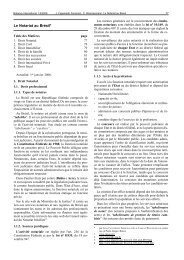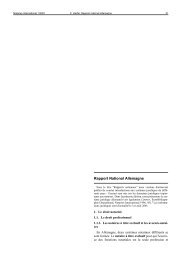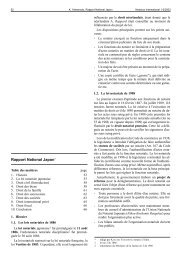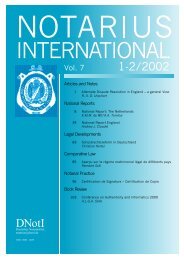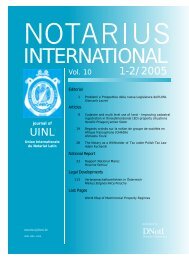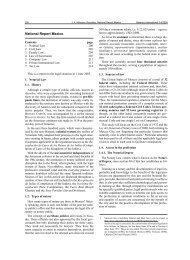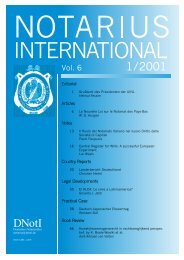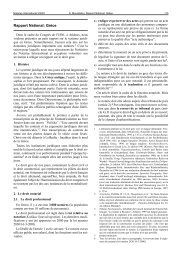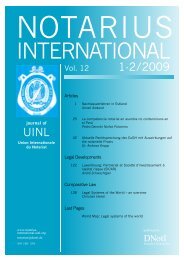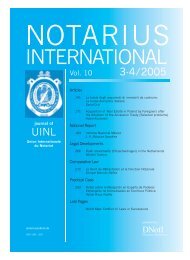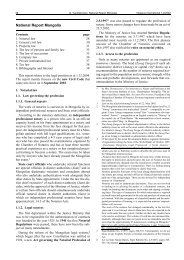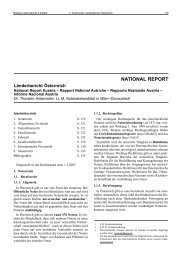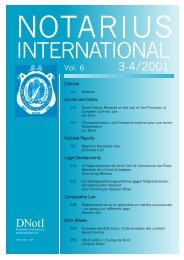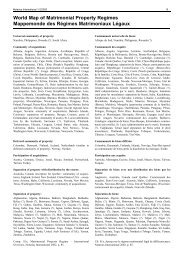ARTICLES and NOTES - Notarius International
ARTICLES and NOTES - Notarius International
ARTICLES and NOTES - Notarius International
You also want an ePaper? Increase the reach of your titles
YUMPU automatically turns print PDFs into web optimized ePapers that Google loves.
146 T. Antenreiter, National Report Austria <strong>Notarius</strong> <strong>International</strong> 3-4/2002<br />
7.2.3 Governing law in relation to formal validity<br />
In so far as there are no special connecting factor provisions<br />
as regards form, 111 the form of legal acts is governed<br />
by the materially applicable law (lex causae) or by<br />
the law of the country in which the legal act is performed<br />
(lex loci actus).<br />
If the law applicable as regards the form of the legal act<br />
provides for compliance with a stricter form, in particular<br />
the participation of a notary as public authenticator,<br />
then this person can also be replaced by the involvement<br />
of a public authenticator of a foreign country, if their authentication<br />
procedure is equivalent to that dem<strong>and</strong>ed by<br />
the lex causae 112 . Thus the notarial act required by Austrian<br />
law for the transfer of shares in a private limited<br />
company can also, for example, be drawn up by a German<br />
notary because his activity is categorised as equivalent<br />
to that of an Austrian notary.<br />
7.3. Law of property<br />
The acquisition <strong>and</strong> loss of real rights in corporeal<br />
items, including possession, are assessed in accordance<br />
with the law of the country in which the items are situated<br />
(lex rei sitae) 113 .<br />
7.4. Family law<br />
7.4.1. Personal Effects of Marriage<br />
The personal effects of marriage depend in accordance<br />
with Art. 18 of the Private <strong>International</strong> Law Statute,<br />
subject to the applicability of the doctrine of renvoi,<br />
in simple terms, first of all on the joint personal governing<br />
law of the spouses (failing which then on the last joint<br />
personal governing law of the spouses), or otherwise on<br />
the basis of the law of the country of joint habitual residence<br />
(failing which on the basis of the last joint residence<br />
retained by one of the spouses).<br />
Chronologically decisive here is the relevant factual<br />
date, so that under Austrian law the governing law is<br />
mutable, in that the connecting factor varies depending<br />
on the factual situation.<br />
7.4.2. Divorce <strong>and</strong> Matrimonial Property<br />
The law applicable to matrimonial property, however,<br />
is determined in accordance with the governing law as regards<br />
the effects of marriage at the time the marriage was<br />
entered into <strong>and</strong> is thus a fixed governing law. With regard<br />
to matrimonial property law, in addition an express<br />
choice of law by the spouses is permissible 114 .<br />
The prerequisites for <strong>and</strong> effects of a divorce depend<br />
on the governing law as regards the general effects of<br />
marriage at the time of the of divorce 115 . There are separate<br />
rules on the law governing the family name of the divorced<br />
spouses (art. 13 IPRG) <strong>and</strong> on the law governing<br />
the prerequisites of remarriage (art. 17 IPRG).<br />
The law applicable to matrimonial property (art. 19)<br />
governs also the consequences of divorce on matrimonial<br />
property. This includes the separation of the spouses<br />
savings (art. 81 öEhegesetz = Austrian matrimonial law)<br />
whereas the assignment of the spouses residential home,<br />
of their furniture <strong>and</strong> of other property used for the spouses’<br />
daily life are governed by art. 20 IPRG 116 .<br />
7.5 Law of succession<br />
7.5.1. Substantive governing law<br />
Legal succession in the event of death is determined in<br />
accordance with the personal governing law of the deceased<br />
at the time of death 117 . A choice of law in not permitted<br />
under Austrian law for any inheritance matters.<br />
7.5.2. Governing law in relation to formal validity<br />
The form <strong>and</strong> validity of testamentary dispositions falls<br />
to be ascertained in accordance with Art. 30 IPRG <strong>and</strong> in<br />
accordance with the Hague Convention on the Form of<br />
Wills, which also applies in Austria, so that testamentary<br />
instructions effectively drawn up in accordance with the<br />
proper legal form at the place where the testamentary<br />
writing is made will be recognised in Austria.<br />
7.5.3. Probate proceedings<br />
In respect of Austrian citizens, probate proceedings<br />
are carried out in relation to l<strong>and</strong> situated in Austria <strong>and</strong><br />
all their world-wide movable assets; this occurs irrespective<br />
of whether administration proceedings are also taking<br />
place in another country (principle of Nachlassspaltung<br />
– application of more than one legal system to an estate)<br />
118 .<br />
In the case of foreign nationals, probate proceedings<br />
are in all cases carried out in respect of l<strong>and</strong> situated in<br />
Austria 119 , <strong>and</strong> under certain circumstances also in respect<br />
of movable assets (in particular where the deceased<br />
was last domiciled in Austria) 120 .<br />
7.6. Company law<br />
The personal governing law of a juristic or artificial<br />
person is the law of the country in which the actual<br />
place where the main administration of the legal enti-<br />
111 There are special formal requirements, for example, in relation to the<br />
form of the marriage ceremony (Art. 16 Private <strong>International</strong> Law<br />
Statute), for contractual obligations falling under the 1980 European<br />
Convention on the Law Applicable to Contractual Obligations (Art.<br />
9, which provides unitary assessment of the formal requirements for<br />
the whole contract in contrast to the Austrian Private <strong>International</strong><br />
Law Statute where the governing law is individually established for<br />
the separate legal acts) <strong>and</strong> for the form of wills (Hague Convention<br />
on the Form of Wills).<br />
112 Consistent practice of the courts<br />
113 Art. 31 IPRG (Private <strong>International</strong> Law Statute)<br />
114 Art. 19 IPRG (Private <strong>International</strong> Law Statute)<br />
115 Art. 20 IPRG (Private <strong>International</strong> Law Statute)<br />
116 There are different opinions in jurisdiction <strong>and</strong> jurisprudence on how<br />
exactly to define the limits of application of art. 19 IPRG (law applicable<br />
to matrimonial property) on the one h<strong>and</strong> <strong>and</strong> art. 20 IPRG (law<br />
applicable to divorce <strong>and</strong> to the consequences of divorce) on the other<br />
h<strong>and</strong>, in particular concerning the application of art. 81 öEheG. See<br />
Schwimann, <strong>International</strong>es Privatrecht, p. 154, 155.<br />
117 Art. 28 IPRG (Private <strong>International</strong> Law Statute)<br />
118 Art. 21 General Rules on Civil Procedure in Non-contentious Matters<br />
(Außerstreitgesetz)<br />
119 Art. 22 General Rules on Civil Procedure in Non-contentious Matters<br />
120 Art. 23 to 25 General Rules on Civil Procedure in Non-contentious<br />
Matters



